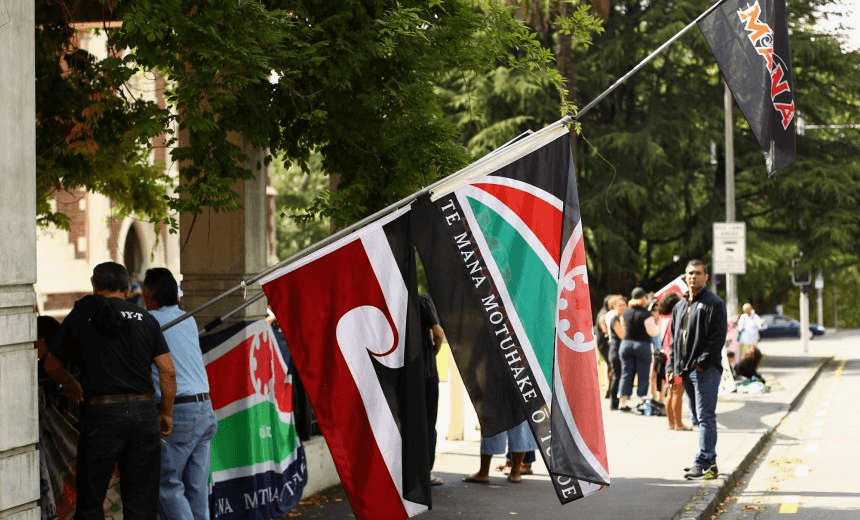The designation of national liberation groups like the PKK as terrorist organisations, and the scrapping of a planned Law Commission review mean the legislation could be abused again, writes Cameron Walker.
The 10th anniversary of the so-called “Urewera raids”, which saw armed police descend on Māori, environmental activists and anarchists, has seen a numbers of important reflections on what happened that day and in the weeks that followed. But what about the controversial legal basis used by police to launch the raids?
The police attempted to charge 12 of the 17 people arrested under the Terrorism Suppression Act 2002 but the then Solicitor General, David Collins, refused permission. The legislation was “unnecessarily complex, incoherent and as a result almost impossible to apply to the domestic circumstances observed by the police in this case,” Collins said. The charge police had their eye on – “participating in a terrorist group” – was better suited to overseas organisations and difficult to apply in a domestic New Zealand setting, he added.
Collins’ thoughtful opinion, and the embarrassment caused to the police when their terrorist conspiracy started to look ridiculous, should ensure the Act is not again misused in a similar domestic setting.
However, it remains on the statute book and its broad and widely defined terms could still see it wielded against supporters of international causes.
Under section 22 of the Act, the prime minister may designate an organisation as a “terrorist entity” if on reasonable grounds they believe it has committed at least one terrorist act. Once an entity is designated its followers can potentially be charged with a number of terrorist offences under the Act and members of the organisation are ineligible for a visa or entry permission to New Zealand.
The definition of a terrorist act in section 5 is broad enough to cover not just horrific intentional acts of violence against civilians, such as 9/11, the Bali bombing or the recent attack in Manchester, but also acts of guerrilla warfare used by groups fighting authoritarian governments or hostile military occupations. In 2002 then Green MP Keith Locke warned the definition would have been wide enough to cover actions of the African National Congress (ANC) during its armed struggle against apartheid or Fretilin during the Indonesian occupation of East Timor.
Essentially, the prime minister of the day can call any armed group they do not like terrorists, even if they pose no risk to the NZ public.
Under Helen Clark’s Labour government only groups on the UN List of Al-Qaeda and Taliban related entities were designated as terrorist entities. However, since 2010 the National-led government has designated 18 entities beyond the UN list.
Some of the groups designated, such as Al-Shabaab in Somalia, have committed horrific acts against civilians. But some other groups designated are considered by some as freedom fighters.
One of these organisations is the Kurdistan Workers Party (PKK), which has been fighting the Turkish government since 1984 for the rights of the Kurdish minority. Their insurgency came as a response to harsh repression of the Kurds, such as bans on the use of the Kurdish language. To this day the Turkish government commits significant human rights abuses against Kurds, including laying military siege to civilian communities, extrajudicial killings of activists and the imprisonment of parliamentarians.
The PKK engages in both armed struggle and more conventional political struggle and activism for its ideology of “Democratic Confederalism”, an anti-authoritarian form of socialism strongly supportive of gender equality and environmentalism.
Originally section 8 included an avoidance-of-doubt clause stating it was not an offence to collect funds for an organisation “intending that they be used, or knowing that they are to be used, for the purpose of advocating democratic government or the protection of human rights”. Unfortunately this was repealed by the Terrorism Suppression Amendment Act in 2007.
This makes it more likely someone could be criminalised who simply wanted to donate to the political wing of the PKK to support its political work advocating for women’s’ rights or the human rights of the Kurdish minority, but did not provide funds to the movement’s armed wing.
The PKK has also fought against ISIS. In 2014 PKK fighters broke an ISIS siege of Mt Sinjar, allowing thousands of Yazidis to escape certain death or slavery at the hands of the Jihadis. In Australia and the United Kingdom anti-terrorist legislation has been used to charge and convict individuals supporting the Kurdish defence against ISIS.
Fortunately the TSA is more restrained than anti-terrorist legislation in Australia or Britain. But its wide definition of a terrorist act means New Zealanders supporting the PKK against ISIS could potentially face charges for participating in a terrorist entity or recruiting members for a terrorist entity among other offences.
The passing of the TSA and the Urewera raids left a black mark on the Clark Labour government. Designations of national liberation groups like the PKK and the scrapping of a planned Law Commission review of the TSA under the Key/English National government made it more likely the legislation could be abused again.
Whoever makes the next government should repeal the Act or amend it to ensure it can only be used as intended rather than against political activists supporting causes for democracy and human rights.
The Society section is sponsored by AUT. As a contemporary university we’re focused on providing exceptional learning experiences, developing impactful research and forging strong industry partnerships. Start your university journey with us today.
